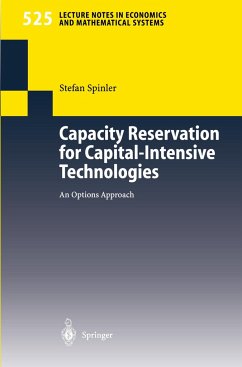This book addresses two key issues of central importance in emerging electronic markets: first, improved coordination of supply and demand through options / forward contracts on output and capacity, and second the integration of such contracting methods with B2B exchanges and electronic markets. The book provides both a thorough review and synthesis of the growing literature in these areas as well extending this literature to accommodate state-dependent demand and contracting. The latter is an important issue since the spot markets for many markets, e.g. energy, are fundamentally conditioned on such variables as temperature, and therefore these "states" need to be accomodated in the underlying theory of financial instruments supporting such contracting. A discussion of emerging applications in logistics, energy, chemicals and e-manufacturing illustrate the importance of the subject matter.
Arguably the central problem in operations research and management science (OR/MS) addressed by e-Business is better coordination of supply and de mand, including price discovery and reduction of transactions costs of buyer seller interactions. In capital-intensive industries like chemicals and steel, the out-of-pocket costs of excess capacity and the opportunity costs of underuti lized capacity have been important factors driving the growth of exchanges for improving demand and supply coordination through e-Business platforms. Stefan Spinler addresses in his dissertation one of the most interesting aspects of this evolution for OR/MS, the parallel development of long-term and short-term markets for capacity and output, accompanied by a range of exotic options and forwards as the basic mechanisms supporting transac tions. This is a fascinating research topic because it builds on the powerful framework of real options, while connecting directly to key operations deci sions (capacity planning, staffing, maintenance, and so forth) of the plants and technologies whose output is the focus of contracts. From the perspec tive of practice, the use of these contracting mechanisms, as facilitated by a new breed of B2B exchanges, represents an opportunity for further improving supply chain performance and capital asset productivity.
Hinweis: Dieser Artikel kann nur an eine deutsche Lieferadresse ausgeliefert werden.
Arguably the central problem in operations research and management science (OR/MS) addressed by e-Business is better coordination of supply and de mand, including price discovery and reduction of transactions costs of buyer seller interactions. In capital-intensive industries like chemicals and steel, the out-of-pocket costs of excess capacity and the opportunity costs of underuti lized capacity have been important factors driving the growth of exchanges for improving demand and supply coordination through e-Business platforms. Stefan Spinler addresses in his dissertation one of the most interesting aspects of this evolution for OR/MS, the parallel development of long-term and short-term markets for capacity and output, accompanied by a range of exotic options and forwards as the basic mechanisms supporting transac tions. This is a fascinating research topic because it builds on the powerful framework of real options, while connecting directly to key operations deci sions (capacity planning, staffing, maintenance, and so forth) of the plants and technologies whose output is the focus of contracts. From the perspec tive of practice, the use of these contracting mechanisms, as facilitated by a new breed of B2B exchanges, represents an opportunity for further improving supply chain performance and capital asset productivity.
Hinweis: Dieser Artikel kann nur an eine deutsche Lieferadresse ausgeliefert werden.








